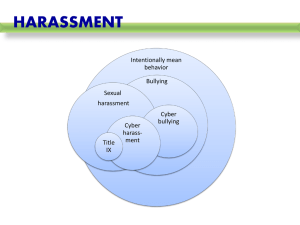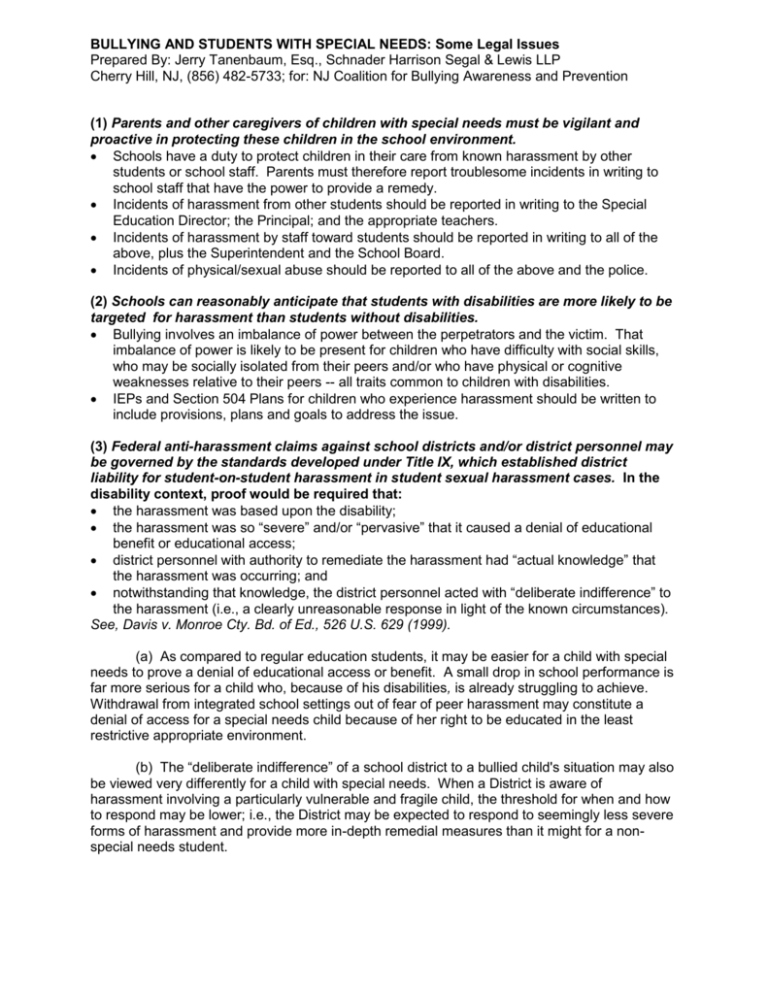
BULLYING AND STUDENTS WITH SPECIAL NEEDS: Some Legal Issues
Prepared By: Jerry Tanenbaum, Esq., Schnader Harrison Segal & Lewis LLP
Cherry Hill, NJ, (856) 482-5733; for: NJ Coalition for Bullying Awareness and Prevention
(1) Parents and other caregivers of children with special needs must be vigilant and
proactive in protecting these children in the school environment.
Schools have a duty to protect children in their care from known harassment by other
students or school staff. Parents must therefore report troublesome incidents in writing to
school staff that have the power to provide a remedy.
Incidents of harassment from other students should be reported in writing to the Special
Education Director; the Principal; and the appropriate teachers.
Incidents of harassment by staff toward students should be reported in writing to all of the
above, plus the Superintendent and the School Board.
Incidents of physical/sexual abuse should be reported to all of the above and the police.
(2) Schools can reasonably anticipate that students with disabilities are more likely to be
targeted for harassment than students without disabilities.
Bullying involves an imbalance of power between the perpetrators and the victim. That
imbalance of power is likely to be present for children who have difficulty with social skills,
who may be socially isolated from their peers and/or who have physical or cognitive
weaknesses relative to their peers -- all traits common to children with disabilities.
IEPs and Section 504 Plans for children who experience harassment should be written to
include provisions, plans and goals to address the issue.
(3) Federal anti-harassment claims against school districts and/or district personnel may
be governed by the standards developed under Title IX, which established district
liability for student-on-student harassment in student sexual harassment cases. In the
disability context, proof would be required that:
the harassment was based upon the disability;
the harassment was so “severe” and/or “pervasive” that it caused a denial of educational
benefit or educational access;
district personnel with authority to remediate the harassment had “actual knowledge” that
the harassment was occurring; and
notwithstanding that knowledge, the district personnel acted with “deliberate indifference” to
the harassment (i.e., a clearly unreasonable response in light of the known circumstances).
See, Davis v. Monroe Cty. Bd. of Ed., 526 U.S. 629 (1999).
(a) As compared to regular education students, it may be easier for a child with special
needs to prove a denial of educational access or benefit. A small drop in school performance is
far more serious for a child who, because of his disabilities, is already struggling to achieve.
Withdrawal from integrated school settings out of fear of peer harassment may constitute a
denial of access for a special needs child because of her right to be educated in the least
restrictive appropriate environment.
(b) The “deliberate indifference” of a school district to a bullied child's situation may also
be viewed very differently for a child with special needs. When a District is aware of
harassment involving a particularly vulnerable and fragile child, the threshold for when and how
to respond may be lower; i.e., the District may be expected to respond to seemingly less severe
forms of harassment and provide more in-depth remedial measures than it might for a nonspecial needs student.
Page 2
BULLYING AND STUDENTS WITH SPECIAL NEEDS: Some Legal Issues
Prepared by: Jerry L. Tanenbaum, Esquire **
Schnader Harrison Segal & Lewis LLP, Cherry Hill, NJ; (856-582-5733)
For: NJ Coalition for Bullying Awareness and Prevention)
------------------------------------------------------------------------------------------------------------------------(4) Current New Jersey State anti-harassment law, as compared to the federal Title IX
construct, presents less hurdles for children who are bullied or harassed in school.
Under the NJ Law Against Discrimination, N.J.S.A., 10:5-1 et. seq., as presently interpreted
by the State Court of Appeals in L.W. v. Toms River Regional Schools Bd. of Ed., 381 N.J.
Super. 465 (App. Div. 2005), a bullied child need only prove that:
the harassment was based upon the disability;
the harassment was sufficiently severe to cause a reasonable person in the victim’s
class to find the environment hostile or abusive; and
district personnel knew or should have known of the harassment, and failed to take
effective measures to stop it.
Actual knowledge and deliberate indifference is not required.
Harassment that might not be deemed sufficiently intense or frequent to create a
“hostile” environment when directed toward a non-disabled child may be found to be egregious
and unbearable when viewed from the perspective of the more vulnerable class of special
needs children.
The Law Against Discrimination provides remedies including money damages and injunctive
relief.
(5) Additional legal recourse exists for special needs children under the IDEA and
Section 504 of the Rehabilitation Act.
The IDEA and Section 504 of the Rehabilitation Act require that a child protected by these
statues be given a “free and appropriate public education.”
The IDEA also guarantees such children the right to be educated in the “least restrictive
environment.” Most courts have found an identical right under Section 504.
If student-on-student harassment deprives a protected child of either of these rights, these
statutes provide remedies that may include compensatory education; tuition reimbursement
for an alternative school; counseling and other services; or (far less frequently) even
monetary damages.
Deprivation of these statutory rights is sufficient to state a claim, even if the District was well
intentioned and tried to protect the child.
For example, even without showing deliberate indifference by school personnel,
bullied special needs children have received tuition reimbursement after their parents
placed them in alternative “safe” environments, because an environment that is not
safe is not an “appropriate” placement. E.g., Shore Regional High Sch. Bd. of Ed. v.
P.S., No. 381 F.3d 194 (3d Cir. 2004); M.P. v. Independent Sch. Dist. No. 721, 326
F.3d 975 (8th Cir. 2003); T.L. v. Somerville Borough Bd. of Ed., 2002 N.J. AGEN
LEXIS 817 (N.J. O.A.L., Oct. 4, 2002).
** Jerry Tanenbaum provides consultation and litigation services relating to educational
matters for children in Pennsylvania and New Jersey.
2
CHDATA 35111_2



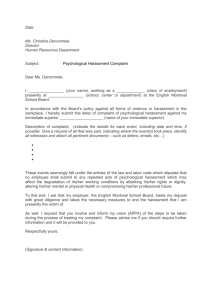
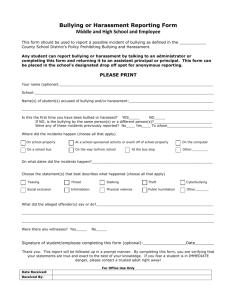
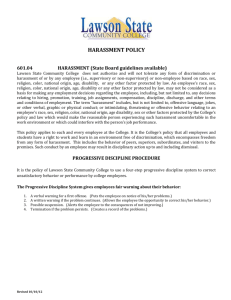
![Bullying and Harassment Advisor role des[...]](http://s3.studylib.net/store/data/006976953_1-320eb77689e1209d082c9ec2464350ee-300x300.png)
